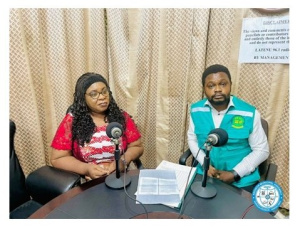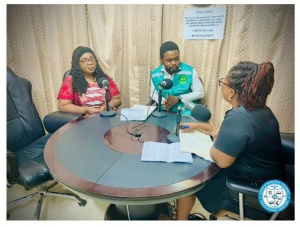

The Krowor Information Services Department together with the office of the stool lands organized a sensitization session to the indigens of the Krowor Municipality at the LATENU radio station (96.1MHz) This event occurred on Tuesday, 18th February 2025.
Mr. Derrick Adjei Ablorh and Madam Naa Adjeley Benson-Sowah from the Krowor department of Stool lands took turns to educate listeners on the mandate of the office of the administrator of Stool Lands which stemmed from the lands act 1996, when they were separated from the Lands Commission.
Mr. Ablorh enlightened listeners on the responsibilities of the office which includes the mobilization of revenues such as rents, dues, royalties, and other payments associated with Stool Lands demarcated areas. Revenue mobilisation is a critical operational mandate carried out by both the District and Regional Offices to ensure efficient collection and management of funds. He continued to throw more light on the assessment of rent for Stool Lands which is conducted based on specific factors such as location, size, and the intended use of the land. It is important to distinguish Stool Lands revenue from Property Tax, which falls under the jurisdiction of the Metropolitan, Municipal, and District Assemblies (MMDAs). He stated, Stool Lands revenue is collected in accordance with the legal framework governing traditional land administration Article 267of the 1992 Constitution.
Madam Benson- Sowah added that revenues mobilised from Stool Lands rent are allocated to various stakeholders as specified by law. The disbursement structure is as follows, fifty-five percent (55%) to the MMDAs, twenty percent (20%) to the government and twenty five percent (25%) to the traditional authority where the stool land is located.
Mr Ablorh reiterated that persons occupying demarcated Stool Lands are required to make payments at any designated District or Regional Office. Payments must be made upon receipt of a Demand Notice issued by a designated officer after a year of the official land lease. This process ensures compliance and proper documentation of payments.
They both concluded on the vital role the office plays in the efficient collection, assessment, and disbursement of revenue from Stool Lands. By ensuring a systematic approach to revenue mobilisation and distribution, the Office contributes significantly to the administration and development of Stool Lands, benefiting Traditional Authorities, District Assemblies, and the respective Stools.
During the call-in segment of the discussion, two callers mentioned that the prices for the ground rent bill is relatively high and suggested a reduction so all can be able to pay. Another caller suggested that they should always issue the bills on time to avoid huge financial backlogs to occupants of the stool lands.
The last caller wanted verification on the actual location of her land. She wanted confirmation as to whether the land falls in Ledzokuku or Krowor; and as per the location given, Mr Ablorh confirmed that the land is situated in Ledzokuku.
The Krowor Information Services Department together with the office of the stool lands organized a sensitization session to the indigens of the Krowor Municipality at the LATENU radio station (96.1MHz) This event occurred on Tuesday, 18th February 2025.
Mr. Derrick Adjei Ablorh and Madam Naa Adjeley Benson-Sowah from the Krowor department of Stool lands took turns to educate listeners on the mandate of the office of the administrator of Stool Lands which stemmed from the lands act 1996, when they were separated from the Lands Commission.
Mr. Ablorh enlightened listeners on the responsibilities of the office which includes the mobilization of revenues such as rents, dues, royalties, and other payments associated with Stool Lands demarcated areas. Revenue mobilisation is a critical operational mandate carried out by both the District and Regional Offices to ensure efficient collection and management of funds. He continued to throw more light on the assessment of rent for Stool Lands which is conducted based on specific factors such as location, size, and the intended use of the land. It is important to distinguish Stool Lands revenue from Property Tax, which falls under the jurisdiction of the Metropolitan, Municipal, and District Assemblies (MMDAs). He stated, Stool Lands revenue is collected in accordance with the legal framework governing traditional land administration Article 267of the 1992 Constitution.
Madam Benson- Sowah added that revenues mobilised from Stool Lands rent are allocated to various stakeholders as specified by law. The disbursement structure is as follows, fifty-five percent (55%) to the MMDAs, twenty percent (20%) to the government and twenty five percent (25%) to the traditional authority where the stool land is located.
Mr Ablorh reiterated that persons occupying demarcated Stool Lands are required to make payments at any designated District or Regional Office. Payments must be made upon receipt of a Demand Notice issued by a designated officer after a year of the official land lease. This process ensures compliance and proper documentation of payments.
They both concluded on the vital role the office plays in the efficient collection, assessment, and disbursement of revenue from Stool Lands. By ensuring a systematic approach to revenue mobilisation and distribution, the Office contributes significantly to the administration and development of Stool Lands, benefiting Traditional Authorities, District Assemblies, and the respective Stools.
During the call-in segment of the discussion, two callers mentioned that the prices for the ground rent bill is relatively high and suggested a reduction so all can be able to pay. Another caller suggested that they should always issue the bills on time to avoid huge financial backlogs to occupants of the stool lands.
The last caller wanted verification on the actual location of her land. She wanted confirmation as to whether the land falls in Ledzokuku or Krowor; and as per the location given, Mr Ablorh confirmed that the land is situated in Ledzokuku.

